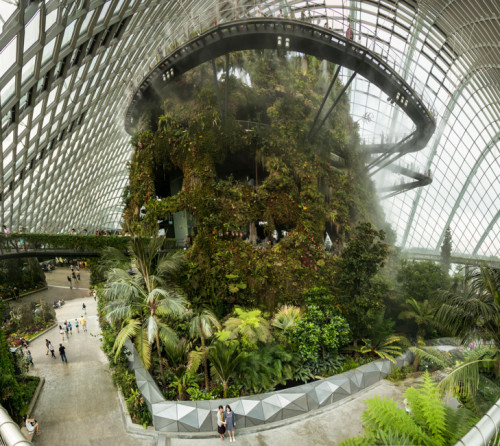
After visiting Jurong Bird Park, as mentioned in the previous blog, we wanted to explore Gardens by the Bay. My good friends Shannon & Bridget were kind enough provide us the free pass for the Gardens by the Bay. We made a mistake at Jurong Station and took a wrong bus from Jurong park. So we got down at Robinson Road and took another to reach Gardens by the Bay. While waiting for the bus to arrive I took this panorama of almost deserted Robinson Road.

Gardens by the Bay is a nature park spanning 101 hectares of reclaimed land in central Singapore, adjacent to the Marina Reservoir. The park consists of three waterfront gardens: Bay South Garden, Bay East Garden and Bay Central Garden. The overall concept of its master plan draws inspiration from an orchid as it is representative of the tropics and of Singapore, being the country’s national flower, the Vanda ‘Miss Joaquim’. The orchid takes root at the waterfront (conservatories), while the leaves (landforms), shoots (paths, roads and linkways) and secondary roots (water, energy and communication lines) then form an integrated network with blooms (theme gardens and supertrees) at key intersections.
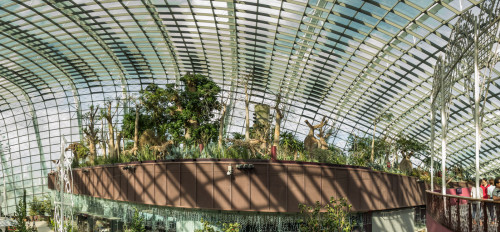
Since weather was pretty hot, we took a shuttle service to easily get around the Bay South Gardens towards conservatories, skipping most of the outdoor gardens. Even though Gardens provided several attractions, as we had limited time to explore, we decided to see only two of them in detail and skip over the rest. The conservatory complex at Gardens by the Bay comprises two cooled conservatories – the Flower Dome and the Cloud Forest, situated along the edge of Marina Reservoir. The conservatories, designed by Wilkinson Eyre Architects, are intended to be an energy efficient showcase of sustainable building technologies and to provide an all-weather edutainment space within the Gardens.
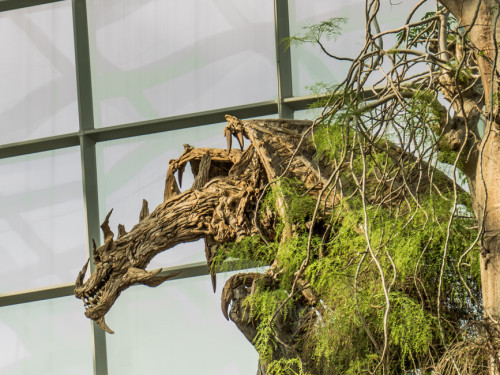
The construction of the glasshouses is special in two ways. First of all by being able to have such large a glass-roof without additional interior support (such as columns). Secondly because the constructions aims strongly at minimizing the environmental footprint. Rainwater is collected from the surface and circulated in the cooling system which is connected to the Supertrees. The Supertrees are used both to vent hot air and to cool circulated water.
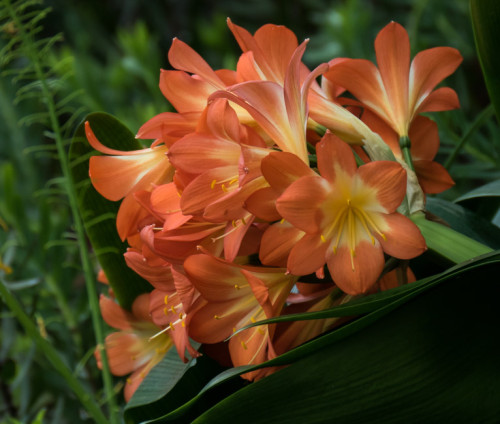
We started at Flower Dome. The Flower Dome is the lower but larger of the two, at 1.2 hectares. The Flower Dome features seven different “gardens” as well as an olive grove with a bistro and a central changing display field with flower shows and displays.
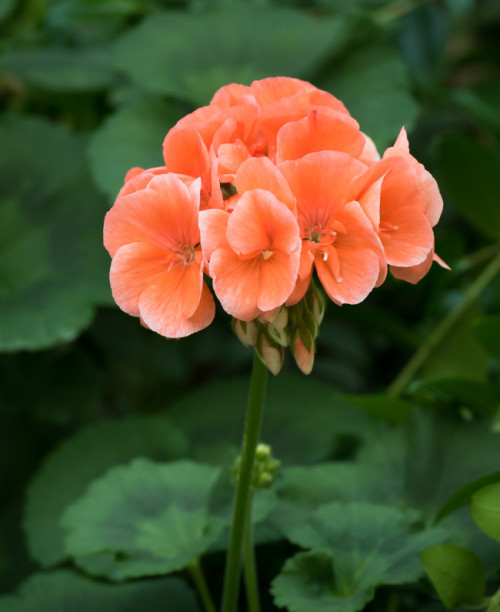
Flower Dome was a spectacular and innovative and the largest glass greenhouse in the world (as listed in the 2015 Guinness World Records). Flower Dome conservatory is 1.2 Hectares, as big as 2.2 football fields put together. With 3,332 glass panels of 42 different shapes and sizes were needed to cover the whole 16,000 square meter surface area of the dome.
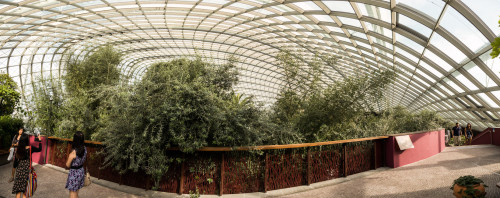
Right at the entrance we were greeted by a level consisting of Baobabs and Bottle Trees – The African Baobab, weighing more than 32 tons, is the largest tree in the Flower Dome. Flowering at night, this species is pollinated by fruit bats, while terrestial mammals like baboons and elephants disperse its fruits by passing the seeds through the digestive tract before germination. This garden also featured dry driftwood sculptures of Galloping horses, an eagle and a dragon.
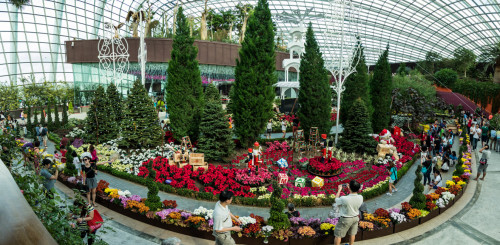
Succulent Garden was the next garden to visit. it helps you to explore into the desert without experiencing the heat and learn more about these prickly plants. As water-storing desert plants, succulents belong to families such as Cacti, Aloes and Crassulas. Look closer and you’ll find that many of these species have sharp spines to protect themselves. A dense cover of blue or grey wax over the surface of their leaves and stems also helps protect them from dehydration and deflect excess UV light in the desert.
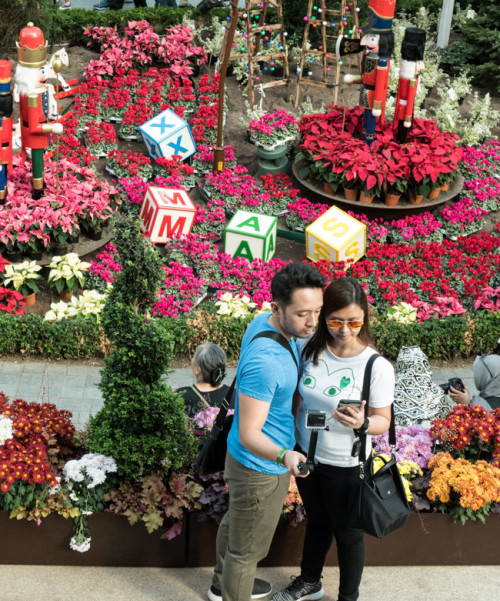
Travel through the deserts of Australia and see the native floral in full bloom at the Australian Garden. In a fascinating showcase of plants Western and South Australia that thrive in a cool-dry climate, discover how different species have adapted to survive the long dry seasons, and how some plants have even come to rely on fires to aid their reproduction.
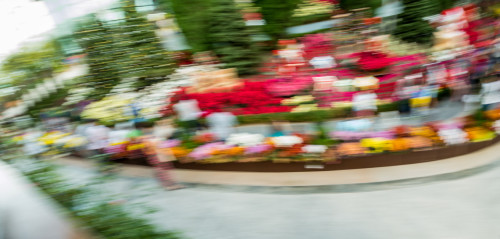
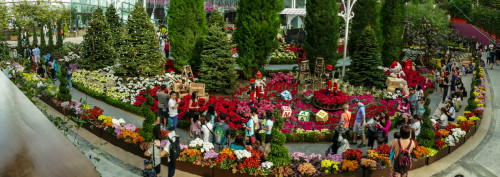
South African Garden – Explore a sea of colourful flowers, evergreen shrubs, succulents and bulbs as you through the South African landscape. South Africa is home to an amazing number of exclusive or endemic species, including ‘Fynbos’ plants. These species have needle-like leaves that form thickets of fire-prone, hard-leaf shrubs that grow in sandy, low-nutrient soil. Many of the plants found in this vegetation have small, dark leaves covered in a waxy outer layer that helps them to retain moisture.
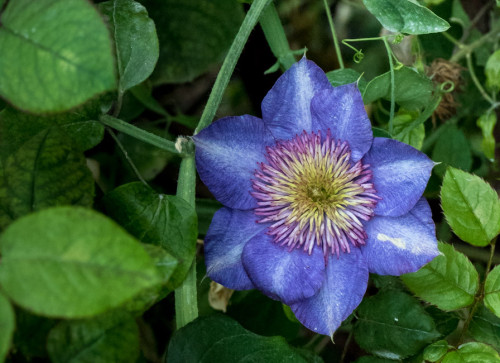
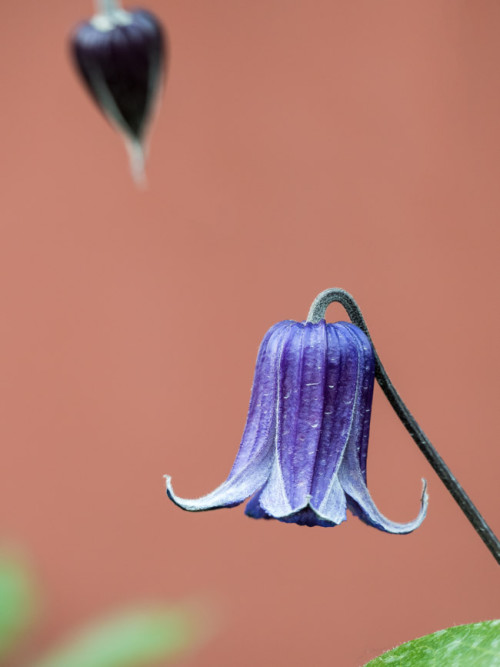
Wander through the stunning Chilean Garden and be mesmerised by exotic plants from Central Chile, such as the Monkey Puzzle Tree and the Puya from the dry rock outcrops in central Chile, and the stunning formation of large specimens of Chilean Wine Palm on the terrace.
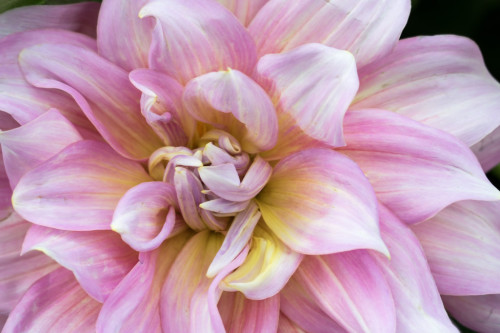
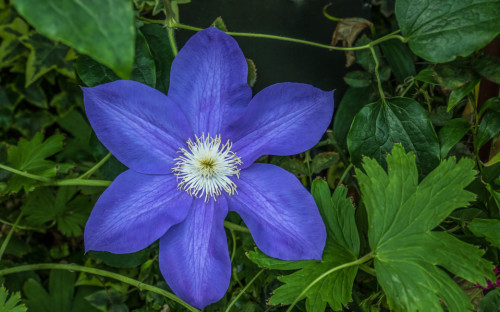
Head up the stairs and be welcomed by the colourful ‘Chaparral’ from the Californian Mediterranean region. Comprising mostly shrubs and a few trees, these plants are affected by natural fires that occur from time to time. Some of the plants also display aromatic, downy foliage to discourage herbivores from browsing on them.
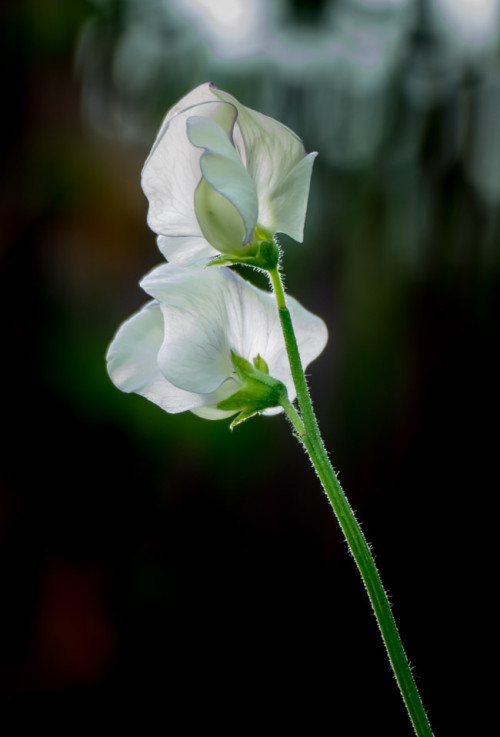
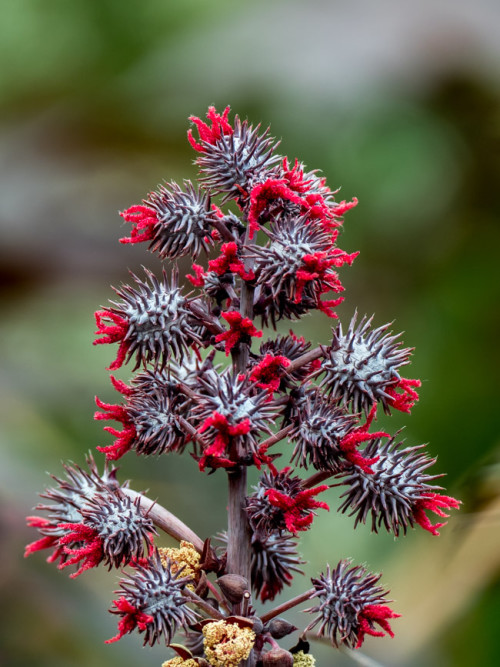
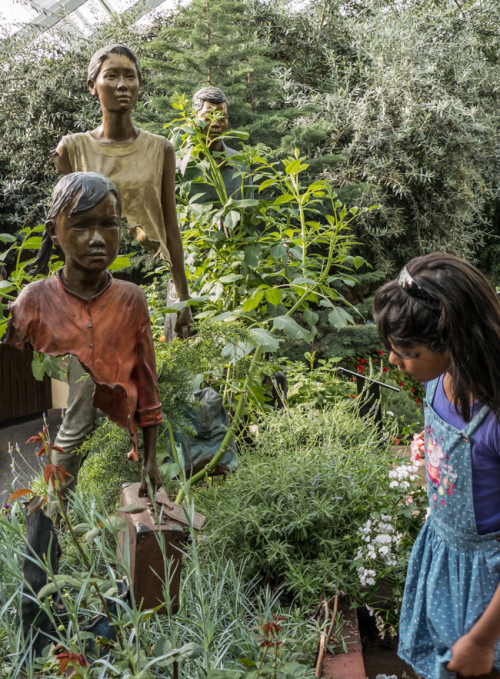
Here we saw the great La Famille de Voyageurs, Sculpture by Bruno Catalano. ‘La Famille de voyageurs’ (A travelling family) depicts a family visiting Gardens by the Bay before heading home. As they depart Singapore, they take with them beautiful memories and leave a part of themselves behind. Inspired by the universal theme of travel, French sculptor Bruno Catalano’s eye-catching works, with their dashed bodies and the deliberate lack of volume, invite the viewer to mentally reconstruct the possibility of the human potential.
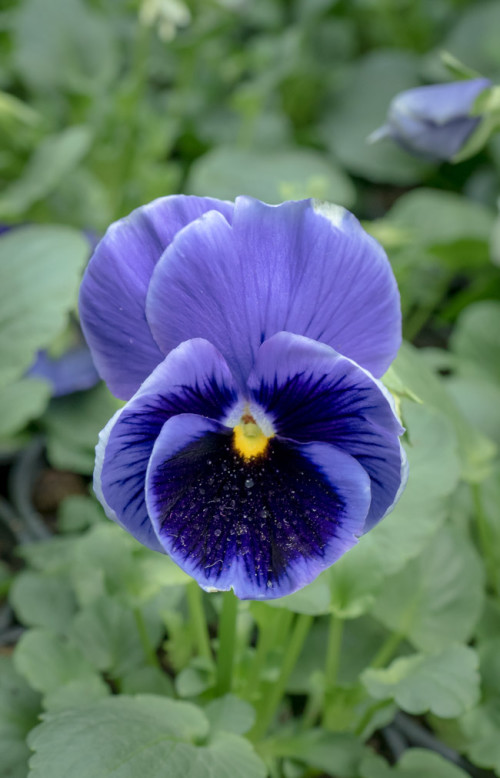
Mediterranean Garden – The Mediterranean Basin is one of the first places in the world to practise agriculture, with crops such as olives, figs, grapes, wheat and lentils. This garden also showcases the region’s native plants, such as the Stone Pine or Date Palm. Don’t forget to stop by the waterfront and admire the beautiful row of Italian Cypresses, which is reminiscent of Lake Como in Italy.
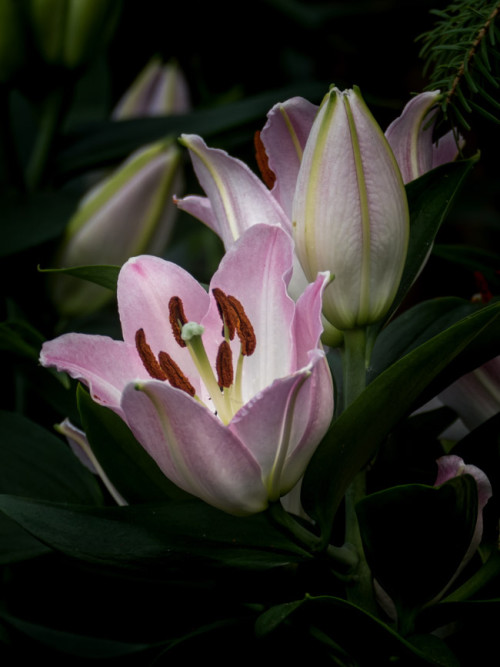
Olive Grove – Olives, figs, grapes, pomegranate and many other crops are characteristic of the Mediterranean region. Grown for thousands of years, they form an important part of the region’s identity and heritage. That groove also hosts a bistro.
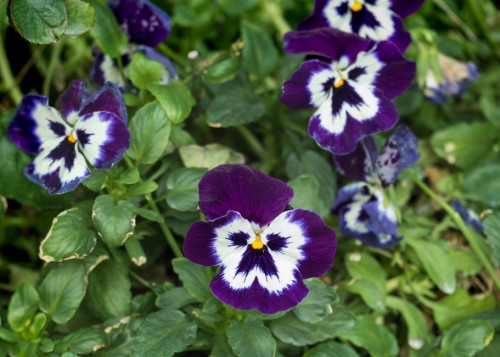
When we visited, Christmas was approaching, so the flower dome was getting ready for Christmas Toyland Floral Display modeled after a traditional German wooden carousel. We could see toy soldiers marching alongside roaming reindeers and teddy bears manning a sleigh station – all amidst beautiful yuletide flowers such as the poinsettia, Christmas rose and winter heather were just getting arranged.
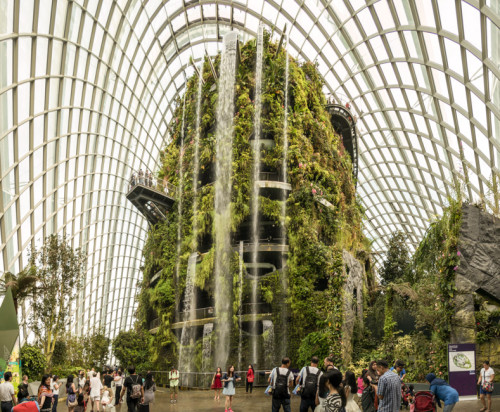
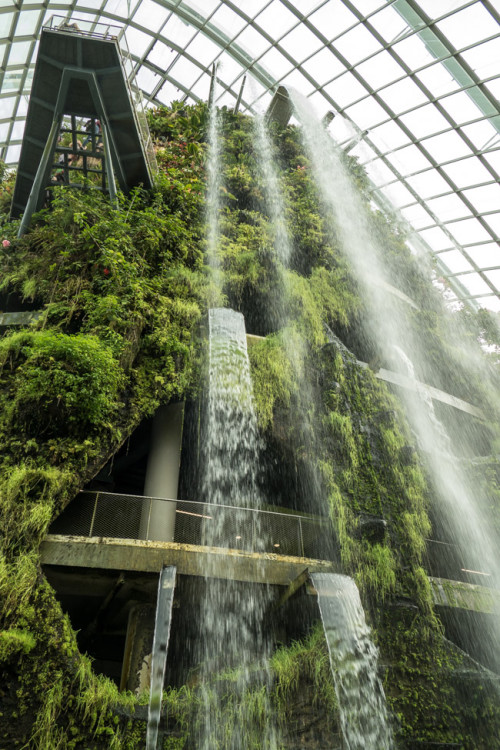
Our next conservatory to visit was Cloud Forest. The Cloud Forest is higher but slightly smaller at 0.8 hectares. It replicates the cool moist conditions found in tropical mountain regions between 1,000 metres and 3,000 metres above sea level, found in South-East Asia, Middle and South America. It features a 42-metre “Cloud Mountain”, accessible by an elevator, and visitors will be able to descend the mountain via a circular path where a 35-metre waterfall provides visitors with refreshing cool air.
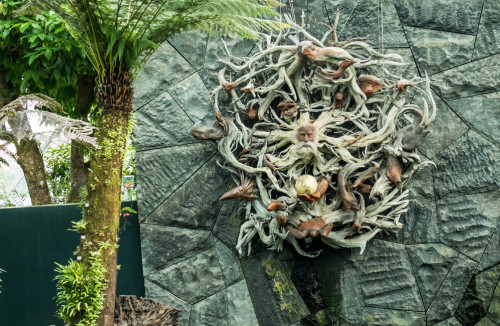
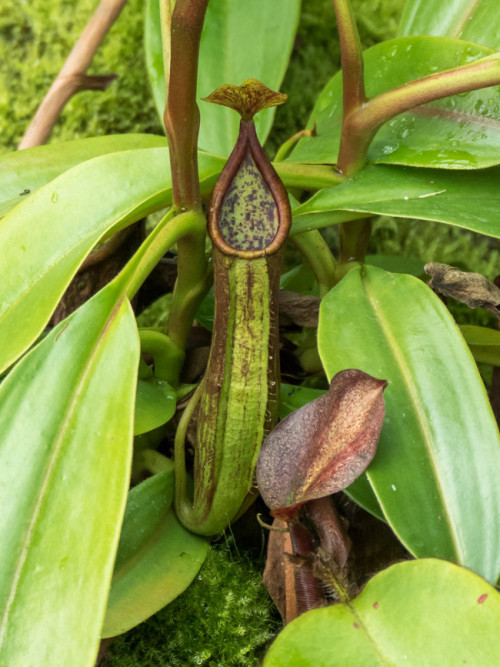
The “Cloud mountain” itself is an intricate structure completely clad in epiphytes such as orchids, ferns, peacock ferns, spike- and clubmosses, bromeliads and anthuriums. It consists of a number of levels, each with a different theme.
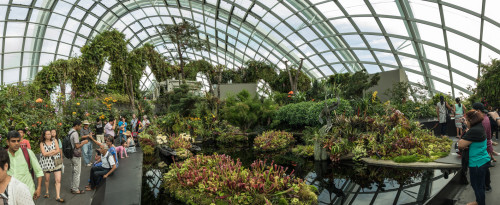
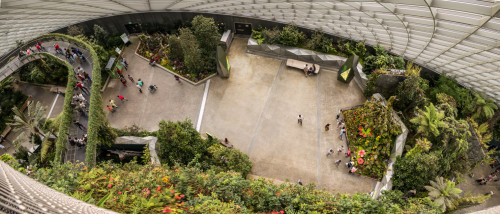
Cloud Forest is divided into the Nine zones. Through the elevator we reach the Lost World, highest point of the mountain, which showcases cloud forest vegetation typically found at around 2,000 metres above sea level. Look out for carnivorous plants such as pitcher plants and the Venus Fly-catcher, against a carpet of delicate ferns and moss, while enjoying fantastic views of the Marina Bay waterfront.
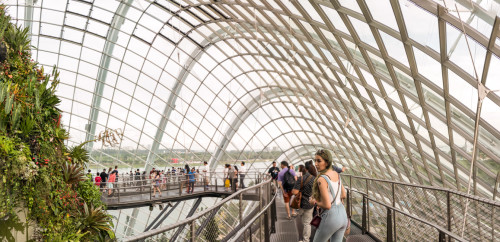
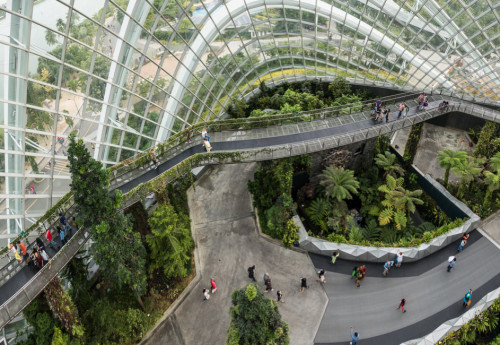
Cloud Walk was on your way down to the plateau below, which takes you outside of the mountain for a close-up view of various epiphytes plant species that clad the side of the mountain.
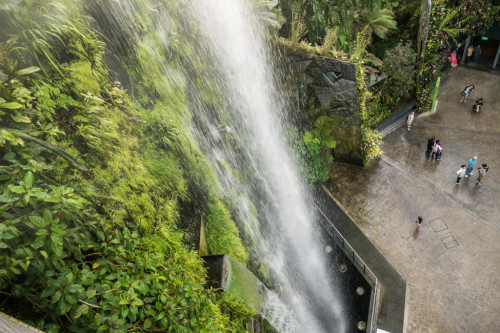
The Cavern is the place to learn about the location, characteristics, unique species and specific life forms of cloud forests around the world. You will be amazed by the various adaptations of epiphytes, which are plants that rely on the support of other plants and do not live on soil.
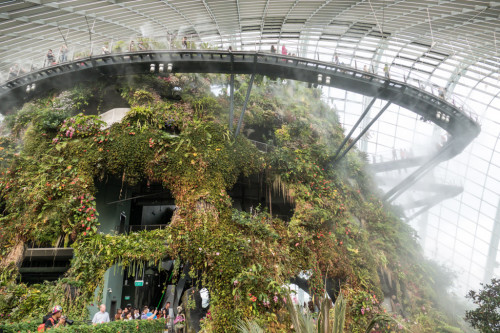
Waterfall View – While enjoying the cooling path behind the waterfall, take a moment to consider the importance of earth’s sources of fresh water. Learn how cloud forests capture water droplets from mist and fog by means of epiphyte-laden branches.
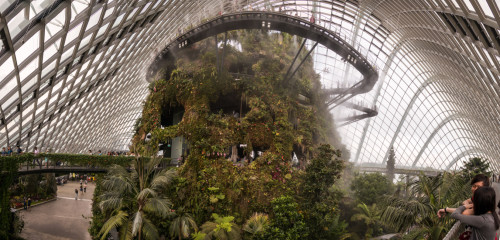
Crystal Mountain Cave below helps to discover the many interesting shapes of real stalactites and stalagmites. learn more about geology, how the continents formed, the age of earth, and the importance of fossils in understanding our planet’s past.
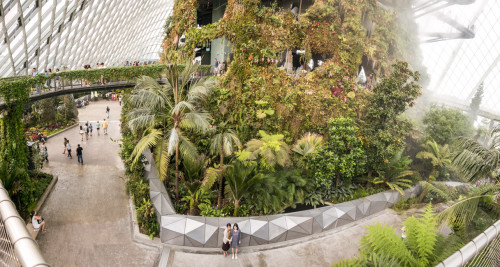
As you approach the bottom of the mountain, the Tree Top Walk will take you close to the forest canopy for a spectacular bird’s eye view of the treetops. There was also a large glass panel which was placed in such a way you can take a selfie of a selfie 🙂
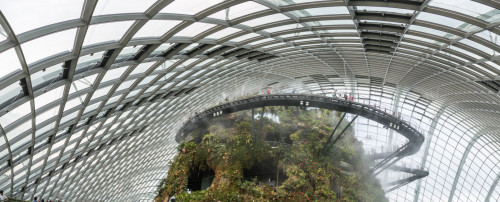
After your walk around the mountain, make a visit to this special lab to find interesting facts, figures and statistics about the state of our planet today, and the problems we are likely to face due to climate change and habitat loss. +5 Degrees is an interactive voyage through time and space allows you to virtually experience the effects of temperature increaseclimate change around the planet globe. We skipped these two as they were more of audio visual presentations.
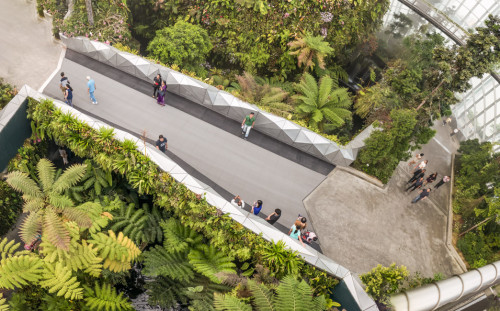
End of our visit was with a stroll around the Secret Garden. Discovering plants that belong to families that once grew in abundance, but have become increasingly rare today – such as the Wollemi Pine from Australia, amazing colours of Gingers and Heliconias.
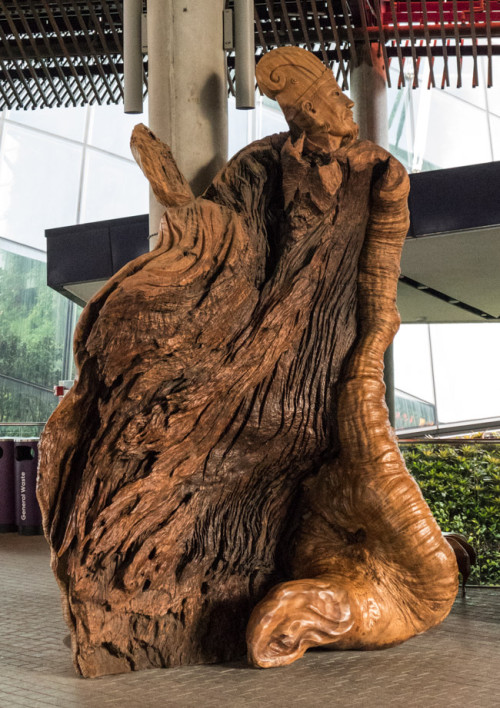
On the way out of the cloud Forest we saw huge wooden sculptures consisting Chinese ruling dynasty and large ants on trees.
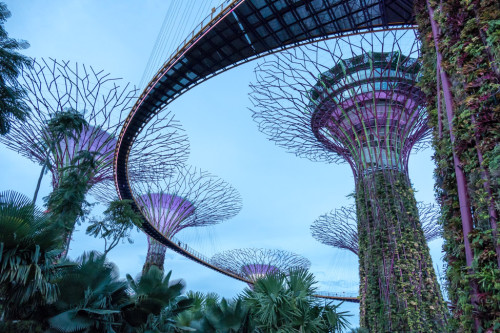
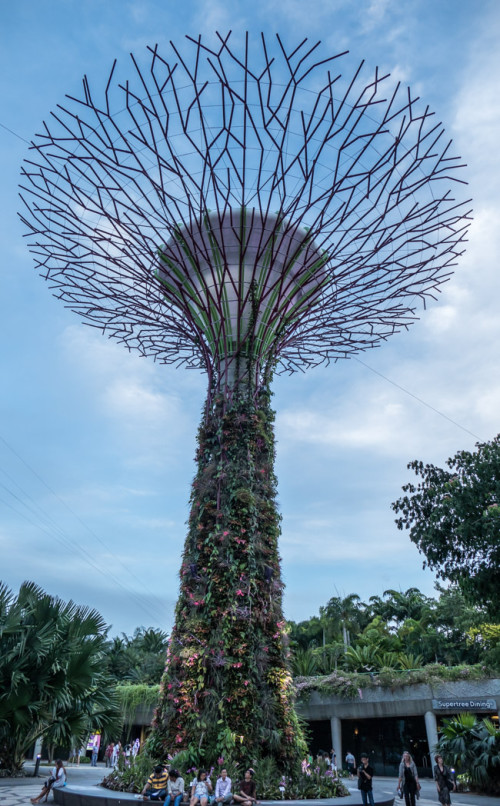
Supertree Groove consist of Supertrees that are tree-like structures that dominate the Gardens’ landscape with heights that range between 25 metres and 50 metres. They are vertical gardens that perform a multitude of functions, which include planting, shading and working as environmental engines for the gardens.
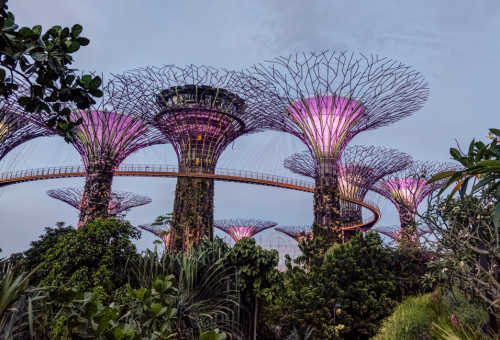
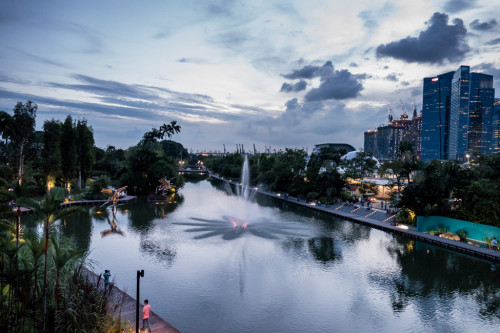
The Supertrees are home to enclaves of unique and exotic ferns, vines, orchids and also a vast collection of bromeliads such as Tillandsia, amongst other plants. They are fitted with environmental technologies that mimic the ecological function of trees – photovoltaic cells that harness solar energy which can be used for some of the functions of the Supertrees, such as lighting, just like how trees photosynthesize; and collection of rainwater for use in irrigation and fountain displays, exactly like how trees absorb rainwater for growth. The Supertrees also serve air intake and exhaust functions as part of the conservatories’ cooling systems.
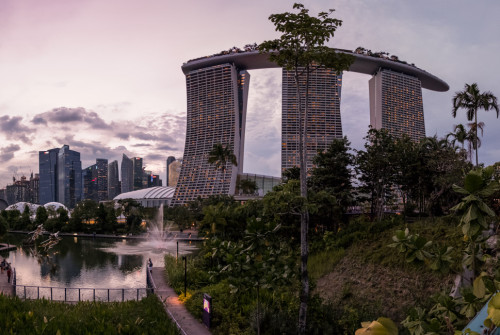
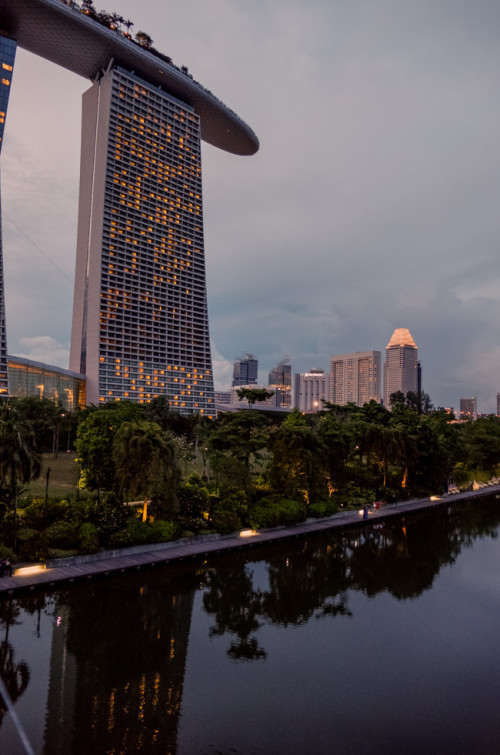
There is an elevated walkway, the OCBC Skyway, between two of the larger Supertrees for visitors to enjoy a panoramic aerial view of the Gardens. A food and beverage outlet is there atop the 50-metre Supertree. At night, the Supertrees come alive with a light and music show called the OCBC Garden Rhapsody.
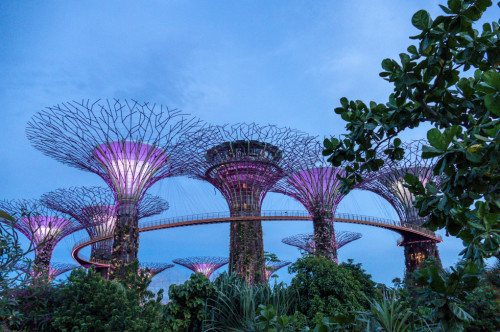
We were exhausted at the end of all these sensory stimulation. So we decided to stroll towards the Bayfront MRT station. On the way we saw the Singapore flyer and Marine bay Sands getting soaked in the late evening glow. 1300 photos has taken toll on the battery life of my camera (despite a spare battery) so I had to conserve the last bit for that last post sunset shot which I was able to squeeze around Marina Reservoir.
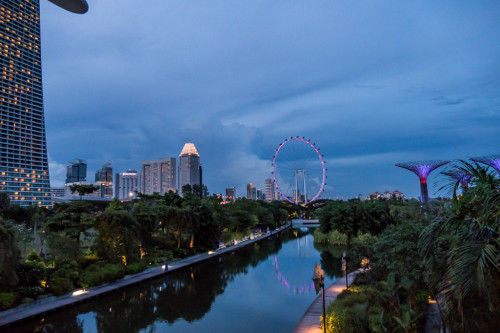
We took MRT to reach Clarke Quay. Closer to our hostel was a Jumbo Seafood. We wanted to experience a Singapore food trip tradition – chili crab. We chose a set menu with Chilli crab. Chili crab was uniquely flavored even though I would not call it fantastic. After such an eventful and enjoyable day we dragged our feet to our hostel next door and soon succumbed to a good night sleep.
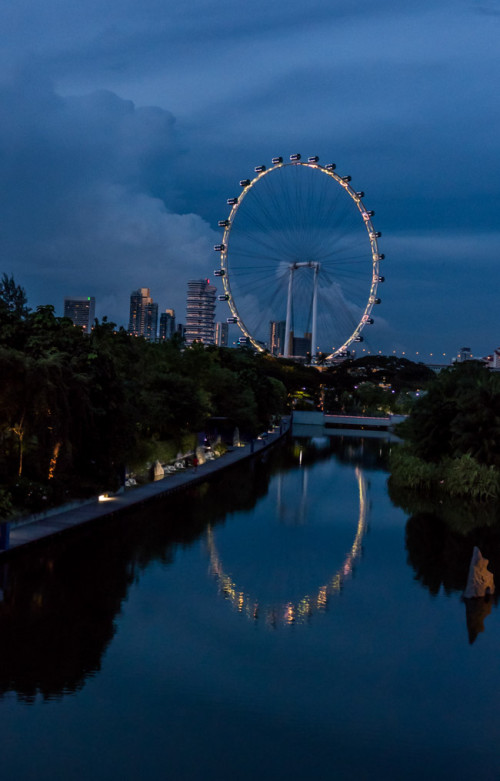
Next day, being our last day in Singapore, we wanted to explore Asian civilization Museum. I will cover that in my concluding blog next week.
You can check all the other parts Singapore travel blog here

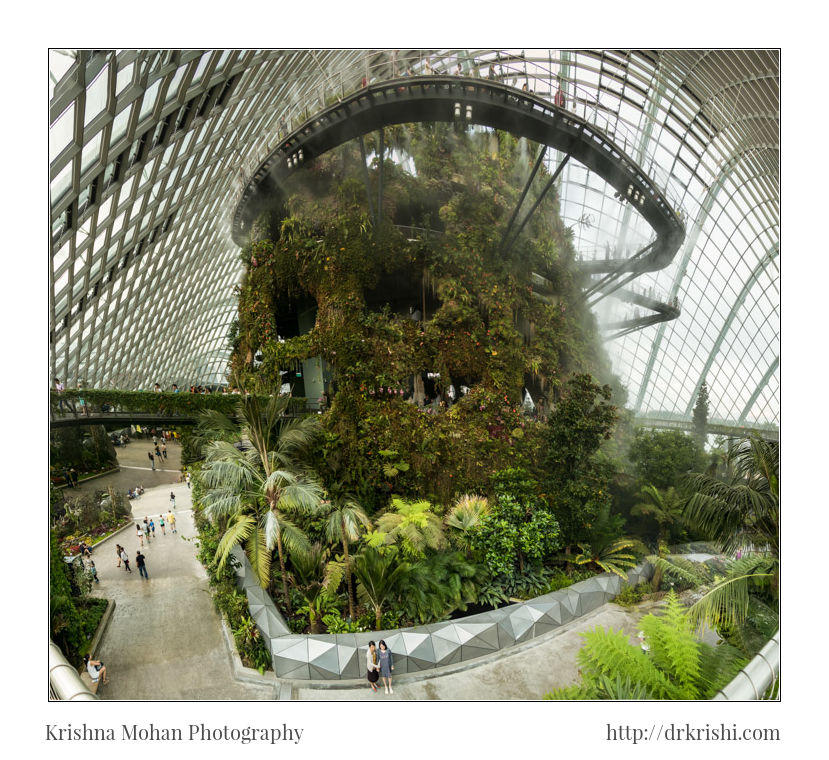
Very nice details with Panaromic photos.
Real feast for the eyes Krishi
You are the best!
Happy New Year!
Be healthy and happy!
My best wishes from Romania!
Gardens by the bay is very mesmerizing
Nice Experiences and narration with photos